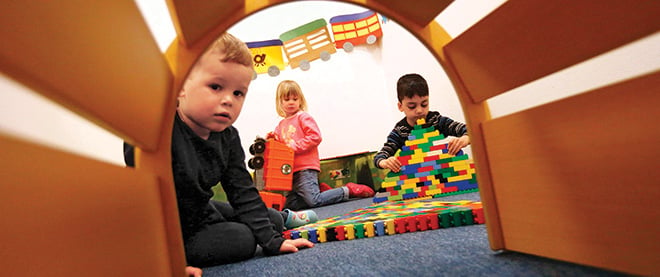Full-day kindergarten is failing our children
A closer look at Ontario’s $1.5-billion-a-year full-day kindergarten experiment
Kai Pfaffenbach / Reuters
Share

When German educator Friedrich Fröebel opened the world’s first kindergartens in the mid-1800s, he frequently found himself at odds with suspicious government officials. Prussia, for example, banned his schools in 1851, characterizing them as hotbeds of socialist subversion and radicalism.
How things have changed. Today, most governments want more kindergarten, not less. Even the traditional half-day programs aren’t enough. Five-year-olds in British Columbia, Quebec, New Brunswick, Nova Scotia and Prince Edward Island all attend full-day kindergarten. Ontario is currently in the fourth year of a five-year rollout for full-day junior and senior kindergarten, meaning kids as young as three attend school all day, five days a week. In those provinces without full-day programs, demands are heard regularly.
Yet despite the popularity of full-day kindergarten, particularly among working parents and teachers’ unions, the actual benefit it provides to the children themselves is still hotly debated.
This September, on the first day of the school year, the Ontario government claimed conclusive evidence of full-day kindergarten’s advantages was finally at hand, thanks to a pair of academic studies it commissioned. “In every area, students improved their readiness for Grade 1 and accelerated their development,” a provincial news release declared. Education Minister Liz Sandals called the results, which tracked students in both half- and full-day kindergarten over two years, “nothing short of incredible.”
This news was immediately hailed by supporters of the concept. Charles Pascal, the driving force behind Ontario’s full-day program, said “it shows the program is truly a life-changer.” In a front-page story, the Globe and Mail dubbed it a “landmark study.”
And yet there was no study to read, landmark or otherwise. The hype and excitement came from a few bullet points selectively released by the province. The actual reports were nowhere to be seen. The reason for this reticence is now apparent.
With the complete reports finally available online, it appears that Ontario’s $1.5-billion-a-year full-day kindergarten experiment is a grave disappointment, from both pedagogical and financial perspectives.
The provincial studies did find that children attending schools marked by low income and/or poor test scores showed improvement in some categories after participating in full-day kindergarten. This corresponds with previous research, particularly by Nobel laureate economist James Heckman, which suggested that early intervention can improve school readiness for disadvantaged children. For everyone else, however, the Ontario results ranged from negligible to abysmal.
Not only did most children not receive a distinct advantage from spending all week at school, the results for many were lower than if they’d stayed in the old half-day system.
“To be clear, some children appear to have done worse with [full-day early learning kindergarten],” the report states. The biggest failings were in the categories of emotional maturity, communication skills and general knowledge. This aligns with complaints that full-day programs impede the social and emotional development of some children by removing them from familial care too early.
Special-needs kids did particularly poorly. “The children with special educational needs showed superior outcomes on the measures of social competence and emotional maturity in non-[full-day early learning kindergarten] programs,” the researchers found, calling for more investigation into this troubling result. It’s a far cry from declaring the whole thing “life-changing” or “nothing short of incredible.”
It is worth noting that even those gains identified for some kids are likely to be temporary, a phenomenon that’s been identified in numerous other studies. McMaster University economist Philip DeCicca told Maclean’s earlier this year that any positive academic effects arising from full-day kindergarten are largely gone by the end of Grade 1. (See “The munchkin invasion,” National, May 27.) Similarly, a study published last year on California’s school system found that, after three years, “there were no significant differences in students who attended the all-day kindergarten program and students who attended a traditional kindergarten program.”
Full-day kindergarten does nothing to permanently improve academic performance. It may stunt the emotional and social development of many kids. And it does no favours to those with special needs. While children from poor or disadvantaged families may derive short-term benefits from extra attention in kindergarten, it defies common sense and financial reality to provide this to all families on a universal basis. The tax system or local authorities are much better suited to targeting children at risk, and at far less cost.
All the above suggests taxpayers in provinces that have so far managed to avoid the full-day-kindergarten craze ought to consider themselves quite lucky. Earlier this year, for example, Alberta announced it was putting its plans for province-wide full-day kindergarten on hold due to budgetary constraints. Wise move.